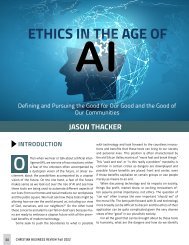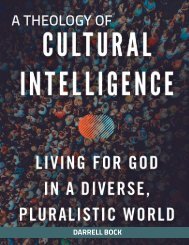Christian Business Review 2022: Pressing On Toward God's Goal
You also want an ePaper? Increase the reach of your titles
YUMPU automatically turns print PDFs into web optimized ePapers that Google loves.
ETHICS IN THE AGE OF AI<br />
CBR ARTICLES<br />
them? Is there a set of moral principles or ideas that society<br />
at large and businesses in particular can agree upon that<br />
would help us navigate the epoch of AI? How might we protect<br />
the humanity of our neighbors while pursuing God-honoring<br />
AI innovations?<br />
To help answer these types of questions and others confronting<br />
the church today, this article will first define AI and<br />
address how it is shaping our view of the world. It then highlights<br />
two primary areas of ethical debate for businesses —<br />
automation and the nature of work, and privacy and human<br />
dignity. We will attempt to chart a path forward, exploring<br />
popular ways of addressing AI ethics in industry. Finally, the<br />
contemporary frameworks will be evaluated against the<br />
<strong>Christian</strong> moral tradition of loving God and loving our neighbors<br />
— centering on human dignity — as we offer some<br />
suggestions to help business leaders navigate these challenges<br />
with both truth and grace.<br />
DEFINING AI<br />
When most people hear or think about AI, our minds tend<br />
to drift toward sci-fi like images of robots and Hollywood<br />
movie plots of advanced machines that either want to<br />
take our jobs or take over the universe. It is easy to see why<br />
given how AI is revolutionizing so much of contemporary society<br />
and altering how we understand what it means to be<br />
human. 2 But before we can grasp how such emerging technologies<br />
as AI are altering our perception of God, humanity,<br />
and the world itself, a firm grasp what AI actually constitutes<br />
must be established.<br />
Artificial intelligence simply put is non-biological intelligence,<br />
where a machine can perform various tasks that<br />
once were reserved for human beings, e.g., processing vast<br />
amounts of information, making decisions based on data and<br />
inputs, and even simulating various human behaviors such<br />
as communication and creativity.<br />
AI represents a broader field of computer science, which<br />
comprises a number of subdisciplines such as machine<br />
learning, deep learning, natural language processing, expert<br />
systems, robotics, machine visions, and even speech recognition.<br />
Many of these systems undergird the conveniences of<br />
modern life and form the backbone of so many digital tools<br />
used throughout society today. Most of the tools we utilize<br />
today, including our smartphones, social media apps, recommendation<br />
algorithms, smart devices for the home/office<br />
tools, and so much more, employ some type of AI technology.<br />
Contemporary society has become increasingly dependent<br />
on AI tools for the conveniences of life, including much<br />
of the personalization and curated elements of our digital<br />
age. As famed computer scientist and futurist Ray Kurzweil<br />
says, “if all the AI systems decided to go on strike tomorrow,<br />
our civilization would be crippled: we couldn't get money<br />
from our bank, and indeed, our money would disappear;<br />
communication, transportation, and manufacturing would all<br />
grind to a halt.” 3<br />
AI has in recent years become a major topic of discussion<br />
across industries given how it can automate, streamline,<br />
and augment various aspects of the workplace. Whether it<br />
is the push to increase revenue at all costs or to downsize<br />
workforce and/or augment productivity in the workplace, the<br />
pressures on business leaders to leverage AI are immense.<br />
As AI has become integrated into our lives in countless ways,<br />
it is radically altering how we see the world around us as well<br />
as challenging how we seek to navigate the ethical issues<br />
before us in the digital age.<br />
CONTEMPORARY ETHICAL<br />
CHALLENGES WITH AI<br />
<strong>On</strong>e of the most ironic things in the age of AI is that we<br />
often talk about, develop, and use these tools in ways<br />
that dehumanize our fellow humans while at the same time<br />
seeking to humanize our machines with sci-fi versions of<br />
AI or even conscious machines. 4 We seek to give these machines<br />
human-like abilities or even jobs that humans once<br />
had, while at the same time treat our fellow image bearers<br />
as less than human by allowing them to be exploited for our<br />
selfish desires or private gain.<br />
Since the beginning of history, human beings in our sinful<br />
nature tend to treat one another as simply means to<br />
our selfish end, often ignoring the inherent dignity of each<br />
person. We may see each other as cogs in the wheel, rather<br />
than humans who deserve our love, care, and respect. In the<br />
midst of competition and ill-defined ethical systems, navigating<br />
ethical challenges arising from technological innovations<br />
can be difficult when there is little to no productive dialogue<br />
between people with different ideological and religious<br />
persuasions. Whether it is algorithmic technologies that are<br />
changing how we view the value of work or the increased use<br />
of AI tools to violate the privacy of individuals in workplaces<br />
CHRISTIAN BUSINESS REVIEW Fall <strong>2022</strong> 512














